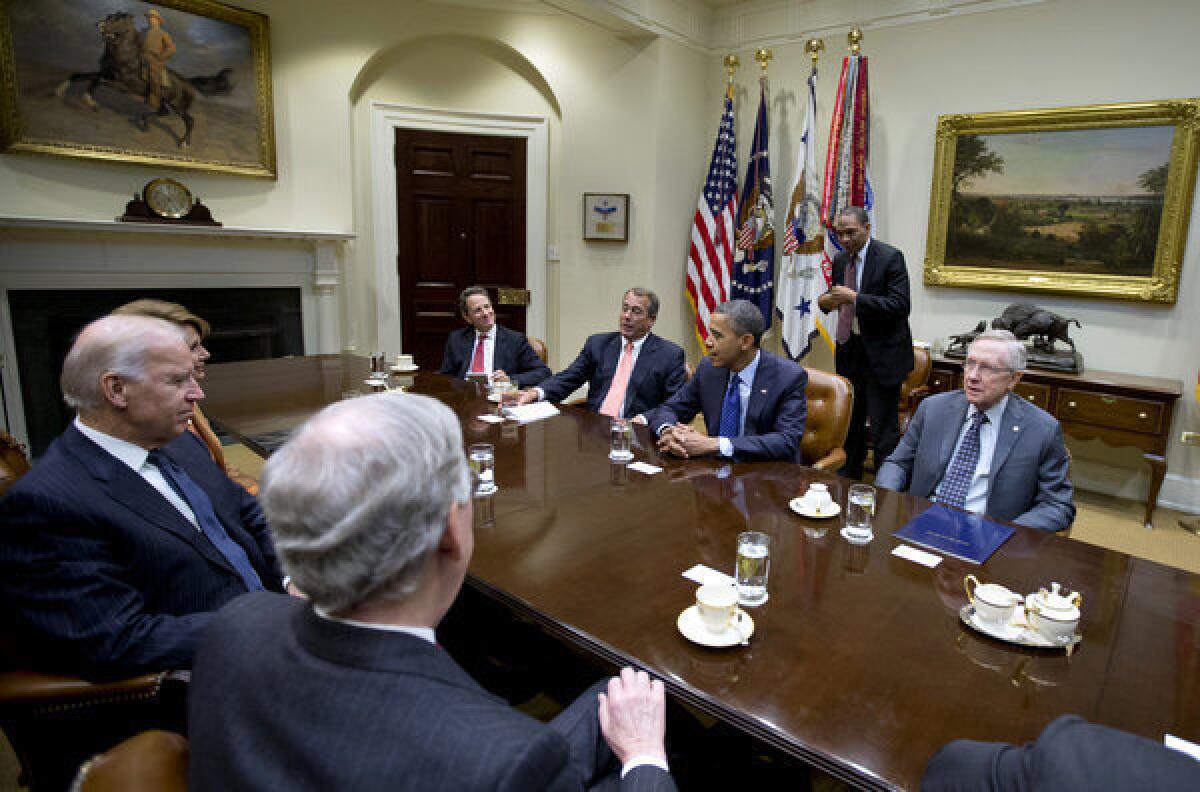Two-part ‘fiscal cliff’ deal taking shape

- Share via
WASHINGTON -- The outline of a compromise over upcoming federal tax hikes and spending cuts began to come into focus Friday after President Obama convened congressional leaders at the White House.
Differences remain, especially as Republicans, led in the House by Speaker John A. Boehner, continue to fight to keep tax rates low for the wealthiest Americans.
But the contours of a two-part deal are taking shape as leaders work to avert the year-end fiscal crisis -- and the gridlock that has soured voters on Washington. Economists warn that failure to deal with the so-called fiscal cliff could launch another recession.
“We have the cornerstones of being able to work something out,” said Senate Majority Leader Harry Reid of Nevada, as leaders from both parties emerged from the White House. “This is not something we’re going to wait until the last day of December to get done. We have a plan. We’re going to move forward on it.”
Boehner, who presented his framework for a broad tax-and-spending overhaul to be undertaken in 2013, also sounded an optimistic note.
“To show our seriousness, we’ve put revenue on the table, as long as it’s accompanied by significant spending cuts,” he said. “It’s going to be incumbent on my colleagues to show the American people we’re serious.”
Obama and Boehner appeared more comfortable together than a year ago, when they tried -- and failed -- to reach a $4-trillion deficit-reduction deal that the financial markets have warned is vital for the nation’s long-term fiscal health.
The two leading actors exchanged a light moment as the president wished the speaker, who turns 63 on Saturday, a happy birthday and gave the known Merlot fan an expensive bottle of Italian red wine.
“My hope is this is going to be the beginning of a fruitful process that we’re able to come to agreement on that will reduce our deficit in a balanced way, that we will deal with some of these long-term impediments to growth and we’re also going to be focusing on making sure that middle-class families are able to get ahead,” Obama said as he opened the meeting in the Roosevelt Room. “We’re going to get to work.”
Friday’s closed-door gathering was the first such sit-down after the election, which emboldened a reelected Obama and his allies on Capitol Hill. Americans spoke at the polls, they maintain, preferring the Democratic approach, which asks the wealthiest taxpayers to contribute more revenue, while preventing steep cuts to domestic spending.
To rank-and-file Republicans, though, the election results signaled that voters want the GOP House majority to hold a final “line of defense,” as Boehner put it, against what they see as excessive government overreach.
Efforts to raise new tax revenue while cutting spending has eluded the parties in the past, but this year’s built-in deadline could give them an incentive.
Within 45 days, taxes are expected to rise on most Americans, a $2,000 average hit as current rates expire on Dec. 31. Massive federal spending cuts scheduled to begin Jan. 2 would cut across defense and domestic accounts, pulling funds out of the struggling economy.
Follow Politics Now on Twitter and Facebook
lisa.mascaro@latimes.com
twitter.com/@LisaMascaroinDC
More to Read
Get the L.A. Times Politics newsletter
Deeply reported insights into legislation, politics and policy from Sacramento, Washington and beyond. In your inbox twice per week.
You may occasionally receive promotional content from the Los Angeles Times.











